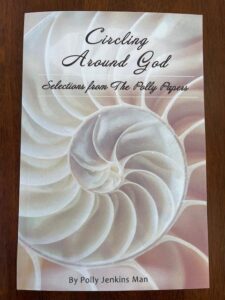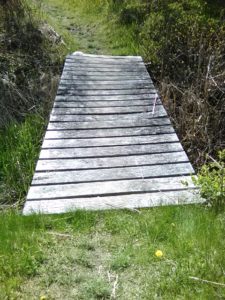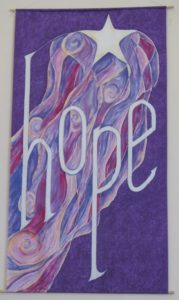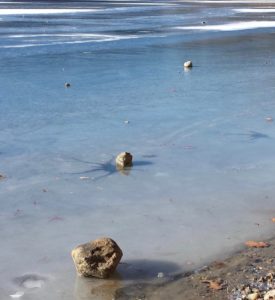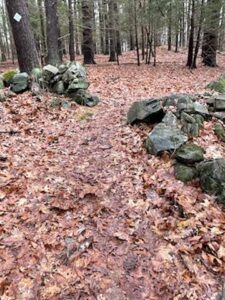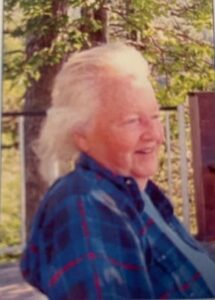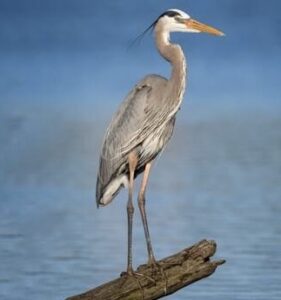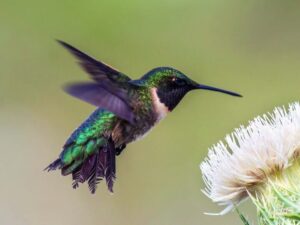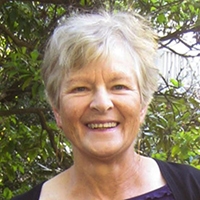 Welcome to The Polly Papers, my reflections and meditations on the surprising, puzzling and unusual glimpses of the Spirit of God in the world. This audacious attempt to capture, in words, a glimpse of an elusive yet accessible being is expressed by a phrase from a poem by Rainer Maria Rilke:
Welcome to The Polly Papers, my reflections and meditations on the surprising, puzzling and unusual glimpses of the Spirit of God in the world. This audacious attempt to capture, in words, a glimpse of an elusive yet accessible being is expressed by a phrase from a poem by Rainer Maria Rilke:
I am circling around God, around the ancient tower, and I have been circling for a thousand years, and I still don’t know if I am a falcon, or a storm, or a great song. (link to full poem)In a way, it similar to decoding our spiritual DNA. Just as the body has its basic building blocks in the genes strung along a double helix, so I believe do we have a spiritual spiral linking all the material available for growing into God-essence. I hope that some of the pieces you will find in these pages will help you unlock your own spiritual DNA. (more)
Latest Posts
Polly Jenkins ManMay 11, 2025When I introduced this blog eight years ago, I tried to imagine a symbol that would capture the essence of my aspiration for “Circling Around God”. The poet Rainer Maria Rilke had inspired the title; “I live my life in widening circles that reach out across the world.” I discovered that an image of the mollusk called the chambered nautilus was perfect: because its shell is an elegant whorl of widening circles within circles; because I could stylize the first initial of my name to resemble the shell and simply because the nautilus’ shell is beautiful. I later learned that the nautilus is a creature that has not changed in over 500 million years. It is often called a “living fossil,” a signifier of the Eternal Other that has existed before humans ever thought of one. When it came time to publish a collection of my essays three years ago, I chose an image of the nautilus for the cover.
Recently, I remembered that, many years ago, I had written a poem about this fabulous animal. I scrabbled through my old notebooks, found it, and realized that I did indeed have a previous history with the chambered nautilus: a poem that I wrote about my father, as he lay dying over thirty years ago.
I offer it here in an abbreviated prose form.
To A Chambered Nautilus for Dad Summer 1994
Whorled, ancient being, when I was young, I found your cast-off shelled shelter one seaside dawn. I picked you up. For forty years and more you have moved with me from house to house; to safe shelves and tabletops where no wagging tail nor window breeze, no falling book would knock you down.
The day my father came and saw you, he turned to me, “It wasn’t yours to keep. You should have left it on the sand.” I knew nothing then of preservation, conservation and plunder without reservation.
And so, my chambered beauty, for twenty years and maybe more, you harbored my guilty grief, though always lovingly, and oh, so carefully, I tended you. Now I have carried you here, to a sacred space, to my window on the pond; to be near water once again, to share with me a mostly empty space filled up with God.
One morning, early, the breeze blew in. Billowing gently, a curtain stirred. It knocked you off; you lay shattered on the floor.
Shattered too, I came to you. With all the mindful, careful days, all the years of fear, of tears, I knelt in sorrow beside your broken body. Your outer shell had cracked, bone-white fragments shattered, scattered on the floor.
Chambered nautilus, no longer upright; exposed, unguarded, you revealed within your purpled beauty: colors of the ocean floor and morning sky; your heart.
And so, my father, you lie upon your bed, bone-white and clear. Freed from being so long upright, you speak to me, curled and smooth. I lie beside you, I hold your hand. Together we speak of ocean floor and morning skies; all the purples, greens and blues of this earth you loved so well. At last, you showed your heart.
Let your bone-white body go now. For you are safe at last and the wind will fly you home. […]
Read more…
Polly Jenkins ManApril 24, 2025Today I received an email including a post from Jennifer Craven’s website, Chop Wood, Carry Water. Because some of you commented on my previous post with your desire to have the kind of conversation that I reported in that piece, “We’re Not Enemies After All.”, I decided to send out this invitation from Jennifer Craven in its entirety. Along with her, I offer you the opportunity to sign up for One Small Step.
From Jennifer: “You’ve likely heard of Storycorps; since their founding in 2003, they’ve recorded nearly 700,000 people across the country talking about their lives. These recordings are collected in the U.S. Library of Congress and in their online archive, which is now the largest single collection of human voices ever gathered. A few of these stories are broadcast weekly on NPR to over 12 million listeners.
Well, recently I found out about an offshoot program of theirs. It’s called One Small Step; its goal is to “bring people with different views together to record a conversation — not to debate politics — but simply to get to know each other as people.” (italics mine) They basically take a liberal and a conservative and have them talk about anything but politics for 50 minutes, with the hope that such conversations will help bridge the yawning chasm between Americans on the left and the right.
I’ve long dreamed of launching a similar project, but knew I’d never have the bandwidth. When I heard about One Small Step, then, I felt very excited. After a phone call with the director I asked to participate in a session myself. Yesterday it finally happened!
The way the program works is: you enter some brief biographical and political information about yourself into a profile. The folks at OSS then match you with someone who has a few things in common with you, but also falls on the other side of the political spectrum. I, for example, was “matched” with a middle-aged woman I’ll call Susan. She’s a mom, and has pets. Beyond that we’re pretty different on paper: she’s a Methodist pastor from rural Iowa, and I’m, well, me.
Yesterday we spoke for an hour, with a moderator present the whole time to help lightly steer the conversation. I have to say it was an overwhelmingly positive experience. I’m not sure if my gal was a Trump supporter, but I’m assuming she is at least politically conservative. Either way, she and I had a really lovely conversation about all kinds of things—except for politics—and by the end were marveling about how much we had in common. We even exchanged email addresses.
Do I think that either of us changed the other’s political views? Almost definitely not. But when I imagine a rural pastor in Iowa now will I automatically assume the worst? I won’t! I’ll imagine someone like Susan!
I strongly believe that projects like these are part of how this country can and will recover. They support what I’ve always called my “neighbor theory—” that we hate people we don’t know who hold opposing political opinions, but when our next door neighbor—who sometimes takes in our trash bins for us—does, we are able to separate the human from the political. Sometimes we can even have an actual conversation with them based in empathy and good will.
Now, I can almost hear some of you saying “but these are terrible people who do terrible things! Why should we try to bridge the gap?” And of course there are some truly irredeemable Trump supporters. But others can be reached. And even the worst can at least meet a “lib” for the first time and maybe be divested of the idea that “owning” us is such a victory.
I guess I just believe that showing each other our humanity can never be a bad thing.
Anyway. The folks at One Small Step are looking for many more volunteers on both sides to have these 50-minute conversations. I told them I’d be happy to spread the word, as I fully believe in what this project is trying to achieve. If you think you might like to try it you can learn more and sign up here. I highly recommend it!” […]
Read more…
Polly Jenkins ManMarch 18, 2025Today I had a conversation that I’ve been wishing for ever since the election last November. I was waiting in line with two women at a local shop. They might have been mother and daughter. The older woman wore a faded blue sweatshirt with the Stars and Stripes and “TRUMP” on the back. A circle of stars with the numbers 45 and 47 inside it was on the front of the shirt, providing the opportunity I have wanted: to engage with others who differ from me politically. How to begin? From the somewhat sour look on the older woman’s face, I was aware that our exchange needed to be civil and open, simply expressing curiousity and interest.
“May I ask you about the logo on your shirt? “
She nodded.
“Can you tell me what it stands for?”
In truth, I hadn’t been able to figure it out since it didn’t match any year or campaign slogan that was familiar.
“It’s for the two Trump presidencies, #45 and #47.”
“Oh, of course! And how do you think it’s going so far?”
“It’s good.”
“Okay. Is there anything in particular you’re glad about?”
Now the younger woman looked up from her phone and started paying attention. She answered, “They’re sealing the borders so that all those criminals can’t get in with their drugs, fentanyl and cocaine and everything. I have this client, an unhoused older man who I’ve been trying to get into an apartment. He can’t walk which means he can’t live in a shelter. It’s been impossible to find anything because criminals and migrants are taking up the spaces. I’ve been everywhere, for weeks, with no luck. and we’re desperate.”
“Wow, that must be awfully frustrating for you, and for him”
“It is, but now finally we have a chance with the borders closing.”
I reflected. While here was a woman who believes, unlike me, that the present administration is good for the country, she is also someone who is caring for one of “the least and the lost” members of our society. I can’t argue with that.
Just then, my name was called. I would have liked to continue our conversation, particularly as the older woman now wore a friendly smile. Instead, I told them I was glad to have talked with them. She responded, “You know, it’s good to have talks like this, even when we don’t agree.* We’re not enemies after all.”
“I’m with you, definitely. This is how we learn. Thanks for talking.”
And I stepped up to the service desk.
*An afterthought: During our conversation, I had never indicated my political preferences. Am I so obviously a progressive liberal Yankee? Hmmm. Worth pondering! […]
Read more…
Polly Jenkins ManFebruary 4, 2025Four p.m. Time to get to my computer, time to take care of some old business. Open computer, log on to their website with my user name and password. Or not, it seems. A brief history: I’ve been a customer of this particular business for, ball park figure, thirty years; that is, before online transactions were available. I am a familiar face to the personnel, even though my visits to the actual place have been fewer recently. Which means that I have “visited” primarily from my computer, always with success. So I tried logging on a second time and received a response, hooray! although not what I expected. For the first time in this long history I was asked to type in a security code which would be sent to my email to be verified. Thus, I checked my email. No code. I waited, checked again. Nothing. One more check some minutes later and there it was. Da-da! Typed it in and read, “this code has expired”. “Okay,” I reminded myself, “I’m not someone who gives up easily, am I?”
I started the process again, from the beginning. Same steps: user name, password, wait for the code. And wait and wait and yes! there it was, and with two or three minutes to spare. Quick, type it in the little boxes. I’m in!! Now, what was the transaction I planned to do? Oh, yes, I remember, a simple funds transfer, one I have done with this business many times before. Okay, look up my account number (plus DOB, phone#, email…didn’t it just ask me that a few key strokes ago?). Got it. Now, make the transfer to the pertinent party. Look up pertinent party account number, type it in space provided, all set. Ahh, another friendly message appears. “You do not have any available accounts for making transfers”. What? Yes, I do, and have had for years. Okay, go to the “how can we help you” bar. Type in my question (politely, of course). A new page appears with several FAQ options. I go to “Transfers from your account”. Maybe I’m getting somewhere. It turns out “somewhere” tells me what I already know, without any information when it doesn’t work. Try again, phrase it a bit differently. I’m trying to be a very polite and patient customer for this particular robot. Same result. I’ll give it another go, but…, hold on. Isn’t the definition of insanity doing the same thing over and over and expecting a different result? Since I’m not yet insane, although getting close, I’ll try calling. There must still be a nice person with a phone on her desk who can solve my problem efficiently and precisely, isn’t there? After all, I’ve been their customer for decades. When I walk in, I’m greeted with a friendly smile and a “how can I help you?’ They KNOW me!
Okay, that’s what I’ll do. It’s still before five o’clock, just. Click back to the home page to find phone number…which isn’t there. Ah, but there is a box I can click to find the office of my (formerly well-liked slowly becoming not very nice) business. There it is! With a local area code AND familiar first 3 digits. Piece of cake. I’m connected. “You have reached the office of ___. Your call is very important to us. Press 1 if you want X. Press 2 if you want Y. Press 3;4;5. Press 6 if you want to speak to a real person”, or something along those lines. I pressed 6. It rang, yes! I’m zeroing in on this thing. And rang. And rang. Be patient, Polly, soon someone will answer and, if not, I can always leave a message. It rang, it rang and it kept on ringing Then it stopped. Over and out!
I think I’ll have a glass of wine.
I do not live happily or comfortably
With the cleverness of our times.
The talk is all about computers,
The news is all about bombs and blood.
This morning, in the fresh field,
I came upon a hidden nest.
It held four warm, speckled eggs.
I touched them.
Then went away softly,
Having felt something more wonderful
Than all the electricity of New York City.
-Mary Oliver
[…]
Read more…
Polly Jenkins ManJanuary 19, 2025“Tomorrow, and tomorrow, and tomorrow,
Creeps in this petty pace from day to day,
To the last syllable of recorded time;
And all our yesterdays have lighted fools
The way to dusty death. Out, out, brief candle!
Life’s but a walking shadow, a poor player,
That struts and frets his hour upon the stage,
And then is heard no more. It is a tale
Told by an idiot, full of sound and fury,
Signifying nothing.”
When I was a sophomore in high school, I was assigned to memorize and recite those verses: Macbeth’s disturbing, portentous soliloquy. That speech has stayed with me all these many years later, popping into my head at times of uncertainty, disappointment and at moments of encounter with futility and foolishness. As it does today; as I anticipate the inauguration tomorrow. Are we destined, four years from now, to look back and know that we were “fools, lighted the way to dusty death?” I fear it. Fear that all our tomorrows will be marked by “a poor player, that struts and frets his hour upon the stage”, yet still married with a hope that “then is heard no more.” That no longer will we hear tales “told by an idiot, full of sound and fury.” Soon, very soon, we shall have our answer.
Tomorrow, however, is also another sort of day. Tomorrow is a day to celebrate a great American prophet. One who summoned us to “build dikes of courage to hold back the flood of fear.” One who, having grown up in a racist, segregated America, kept an eye always on his dream of a brighter tomorrow. A man who gave his life in pursuit of justice and reconciliation. Martin Luther King, Jr. warned, “We must live together as brothers or perish together as fools.” In a time of dreadful uncertainty, these are the words and his is the life and the example that can guide us; a north star that beckons us to follow as we keep our footsteps on the road to justice, mercy and love.
Tomorrow: Tomorrow, four years ago: hear once again the words of a young poet full of hope, a call that rang out from the Capitol to the nation, summoning us all to believe: “For there is always light/ If only we’re brave enough to see it/ If only we’re brave enough to be it.” […]
Read more…
Polly Jenkins ManJanuary 8, 2025A cold coming we had of it
Just the worst time of year
For a journey, and such a long journey:
The ways deep and the weather sharp,
The very dead of winter.
So wrote T.S. Eliot about three visitors from the East who traveled to see a newborn child. It was a long and harsh trip, with only a star to follow. To find…What? What did they expect to find?
Theirs had been years of study, watching the stars, looking for a celestial sign. Then, one dark night, those wise men, now with aged and wrinkled faces, saw a bright star blazing overhead. They believed the star would lead them to find what they sought. A king?; or maybe one greater than a king? Perhaps a savior, though not entirely sure what that might be.
And they found, in an ordinary shelter, a baby, a tiny, squalling infant. Was he what they expected? Perhaps not. Yet somehow, they knew that they had come to the right place. And dropped to their knees; in wonder and in thanks.
Theirs is the story of Epiphany. There, next to a cradle, all the knowledge from their years of study was transformed into wisdom of the heart. They knew, they recognized, they worshipped. Then returned home by a route different from the road that had led them there, choosing to evade Herod’s command to bring him the news of the birth. That’s how their story ends.
But what if their return by another way was not only about escaping Herod’s ugly plan, but about a change of heart, a new way of perceiving? They had experienced what is known as an epiphany; that is, an appearance of holy presence. It led them to walk a new path, previously untrod, on their life’s journey. We don’t know because the story doesn’t tell us, just how their lives changed, but I suspect that no longer did they rely on signs like a star to guide their lives. They began to follow their heart’s leading. In the presence of holiness, something shifted. An awareness, an assurance of a light within, a beacon as trustworthy as a blazing star. Perhaps that was the “other way” which they had found by the cradle.
Epiphany asks all of us: In this new year, what will you be searching for? Where will your journey take you ?
And Epiphany asks us: Is it time for us to try another way? Is there an “Aha” out there already waiting for you? And will you know it when you find it? Will it cause you to turn to the business of living by another way? […]
Read more…
Polly Jenkins ManDecember 27, 2024Seven years ago I posted my first winter reflection, acknowledging the longest night of our northern winter solstice. This year the solstice fell at 4:21 AM on December 21, Eastern Standard time. In ancient and still current traditions, it is a time we light fires to dispel the darkness and to celebrate the re-turn of the northern hemisphere toward the sun. In my Christian tradition, though Christmas Day is past, we are still in the season of Christmastide, waiting for the days to lengthen a few seconds more each day, waiting for Epiphany, commemorating the visit of three wise elders who came from far away to see the child and recognized him as the promised One to Israel and beyond. And since it is also the season for telling this and other old stories; at the solstice fire, by the tree, or by the light of the menorah candles; as I did seven years ago, once again I invite you to reflect on this beloved folk tale.
THE RABBI WHO WALKED IN THE WOODS
A long time ago, far from here, a monastery stood on the edge of a forest. In its day, it had been grand and glorious, with brothers who offered hospitality to strangers and filled the abbey with song. But it had fallen on hard times. People no longer came to its door and only a a handful of monks shuffled through its corridors, praising God with heavy hearts.
On the edge of the woods, an old rabbi had built a hut, where he would come from time to time to fast and pray. No one ever spoke with him but whenever he appeared, one monk would say to another, “The rabbi walks in the woods.”
After morning mass one day, the abbot of the monastery decided to visit the rabbi and tell him of his troubles. Approaching the hut, he saw the rabbi standing in the doorway, his arms outstretched in welcome, as if he had been waiting there for him. The two embraced, then stood apart, looking at each other, their faces wreathed in smiles. After a while, they entered the hut, where a rough table stood with the Scriptures open on it. The two old men sat together awhile in silence in the presence of the book. Soon, the rabbi began to cry. Then the abbot, too, covered his face with his hands and began to weep. For the first time in his life, he cried his heart out. They sat there like lost children.
Later, when all was quiet, the rabbi spoke. “You and your brothers are serving God with heavy hearts. You have come to seek a teaching of me. I will give you one, but you can only repeat it once. After that, you may never say it aloud again.”
The rabbi gave him his teaching: “The Messiah is among you.”
The abbot left, without another word.
The next morning the abbot called the monks together. He told them that he had received a teaching from the rabbi who walks in the woods and that this teaching was never to be spoken aloud again. He looked at his brothers and told them, “The rabbi said that one of us is the Messiah.”
The monks were startled. What could it mean? Is Brother John the Messiah? Father Matthew? Could I be the Messiah? They were all deeply puzzled by the rabbi’s teaching, but no one spoke of it again.
As time went by, the monks began to treat each other with a new reverence. The lived with each other as people who had finally found something, while they prayed together as people who were still looking.
Occasional visitors found themselves deeply moved by the life of the monks. Before long, people came from far and wide to be nourished by the prayer life of the monks, while young people began asking, once again, to join the community.
In those days, the rabbi no longer walked in the woods. His hut had fallen into ruins. But the monks had taken his teaching and kept it in their hearts. And they knew too, that the ancient promise had been fulfilled, that the Messiah was born and was in their midst. […]
Read more…
Polly Jenkins ManOctober 15, 2024When they brought her to be baptized, she was given her mother’s name, Aurelia. But when her father peered into her cradle he announced, “her hair looks like thistledown”. Her infant halo of white thistledown hair was an aura that never left her, especially when that hair turned the soft white of her later years. The name defined her; her will o’ the wisp ways, her desire and her decisions to go wherever the wind blew and her spirit led; her unique, fey wonder and curiosity about the world. And thus, the beautiful child with the thistledown hair was, from that day on, known as Thistle. An accomplished and prize-winning artist, a sailor, a life-long adventurer and my father’s much younger half-sister, she was my aunt and my godmother.
Friends and acquaintances used to ask me about her name, imagining that someone called Thistle must be a prickly person, like the purple Scottish wildflower.
Sometimes that was true. She was determined to follow her inner guiding light and not always patient with those, particularly my accountant father, who could never understand yet another Thistle exploit. But I believe it was that spirit which allowed her to choose exactly how she moved through life.
Thistle showed me how to be an independent woman that followed her talent, her dreams and sense of adventure wherever it might lead.
She was the young woman who once took me, a shy, fearful ten-year-old who had hardly ever skied, to the top of Spruce Peak in Stowe, Vermont and told me, “just head downhill.”
Years later, she was the aunt who showed up at Columbia- Presbyterian hospital in Manhattan a few days after my first child was born. Since her visit happened to be on the Fourth of July, she came equipped with champagne and firecrackers, popping the cork of the former and setting off the latter. A moment later, what appeared to be the whole maternity staff rushed into the room, believing a bomb had gone off. They gave Thistle quite a dressing down while my baby girl slept right through it!
Thistle won a Fulbright to paint in India in 1960. Somehow she once managed to get herself invited to take tea with the Maharajah of Jaipur. While sitting on the terrace, she saw one of his handsome horses in the pasture and asked if she could paint it.
“Of course you may. Please come back in a day or two so he will be ready.” She returned at the appointed hour and found, to her amazement, a groom next to the horse holding a large brush and a bucket of gold paint; “to paint the horse!”
The Thistle moment that I cherish above all is the day she told me the details of the trip which she had arranged to fulfill Mum’s lifelong dream to visit Ireland. Thistle changed her own trip back home from India in order to spend time there with my mother. Two months later, my mother died, tragically and violently. Finally, all those many years later, it was during that telling that I was able to see into the troubled, dark places that my mother had long carried within. Better than all the rest of my family, Thistle understood my mother; her struggles, her hopes, her very soul. In the telling of that tale, I saw a side of my aunt I hadn’t known previously: her deep wisdom about human nature and an intuition that guided her understanding. No longer was she simply the fun-loving, unpredictable, risk-taking adventurer. That day she became a true godmother, a God-given mother to me.
Thatch-roofed Irish Cottages. Aurelia C. Brown 1961
Thistle helped me laugh and helped me weep. She showed me that I could be equally at home sleeping by a campfire in the woods or dining with the rich and the famous. She taught me to stretch myself artistically, intellectually and spiritually. She showed me that what the world thinks I should be is never as important as how my Spirit is leading me.
Thistle has been gone for many years. So why do I write this now?
Because on this October day, as I see thistledown departing its earthbound flowers; as wisps of white quietly leave on the breeze and knowing that soon they will all be gone, I like to imagine that Thistle too floated off on a gentle breeze at the end. How beautifully they drift into the sky! How lovely are they in their dying, leaving a blessing at the end of their life. As Thistle-down did for me. […]
Read more…
Polly Jenkins ManSeptember 25, 2024On days when I feel, like the poet, “that the world is too much with us,” I often turn to one of a handful of poems that through the years have brought me a measure of solace and peace. Today is one of those days: the news of the world is all about “guns and computers.” “…getting and spending, we lay waste our powers, little we see in Nature that is ours.” Today I turned to the poet Mary Oliver, but she didn’t speak to me in a way that she usually does. Seeking another way for comfort, to escape from the barrage of bad news, I took myself to a well-trod path by a nearby pond. “I went to the woods (to) see if I could not learn what it had to teach.” Hardly ten minutes had passed when I heard the unmistakable “krunk “of the great blue heron, arriving on its pterodactylic wings. It settled onto a graying, water-bound stump, standing there, majestic; a silent statue on its wooden plinth, gracing me with its presence.
“Ahh”, I sighed, or it might have been “Amen”; and walked on. Scrubby bushes bordered the path, now and then opening up to allow a narrow window of water, where a duck was gliding along. My first thought was, ho-hum, it’s probably just another mallard or black duck, such an ordinary sight. However, I reminded myself, that while I’ve seen many thousands like it in my life, I had probably never seen this one before. So I raised my binoculars to see, instead, in full multi-colored plumage, a “wood drake (resting) on its beauty on the water.” A complete surprise: first, the “pop” of the iridescent green, russet, tan and its red eye; next, astonishment that on an early autumn morning, the drake appeared in full breeding plumage. But then, what do I know. Nature never fails to amaze me.
I am rarely disappointed by the poem that I read each morning, which is why today was an exception. Yet never did I expect that in the woods, pondside, I would find the right poem waiting for me, the very poem I needed. It was there that Wendell Berry’s “The Peace of Wild Things” had taken form, become alive, manifest to me on this ordinary day, during a quiet ramble.
When despair for the world grows in me
and I wake in the night at the least sound
in fear of what my life and my children’s lives may be,
I go and lie down where the wood drake rests
in his beauty on the water, and the great heron feeds.
I come into the peace of wild things
who do not tax their lives with forethought of grief.
I come into the presence of still waters.
And I feel above me the day-blind stars
waiting with their light. For a time
I rest in the grace of the world, and am free.
This poem hangs, illustrated and framed, above my bed. A mantra, you could say. So how can I, how could anyone explain the synchronicity of my sightings today with the creatures of a poem that is often my lodestar? “Fools give you reasons, wise (ones) never try,” because there is no logical explanation. So, therefore…
“When turning and turning in the widening gyre …(when) things fall apart, …when the center cannot hold”: your center, my center, our nation’s center; when our planet itself is barely holding on, teetering on the edge of “mere anarchy, loosed upon the earth”, then…
Go to the woods, sit with a poem, defy rational explanations and lose yourself in wonder. For a time, “rest in the grace of the world,” and be free.
A note: I have quoted a scattering of unlikely bedfellows in this essay. In order they are: William Wordsworth, Mary Oliver, Wordsworth again, Henry David Thoreau, Wendell Berry, Oscar Hammerstein, William Butler Yeats. […]
Read more…
Polly Jenkins ManSeptember 2, 2024Every day, before we began to work, Charles would gather us in a circle, invite us to join hands as he prayed, “Heavenly Father, thank you for this day that we have never seen before.”
Charles lifted up that prayer eighteen years ago, in a driveway of New Orleans, as the city was just beginning to recover from the devastation of Hurricane Katrina. I was there as part of a team from Concord and Acton, assigned to rebuild Charles and Winnie Wilmore’s house. Charles is hard to forget; a retired postal worker who was living in a toxic FEMA trailer parked in front of the house that he and Winnie had moved into just three weeks before the storm. When they looked out the window of that cramped and shabby trailer, the first thing they’d see was their ruined dream. And yet, and yet…every morning, without fail, he would bow his head and thank God for a new day, a day that had yet to unfold, when anything might happen. And, if he’s still around, I have no doubt he’s saying it now.
I want to be like Charles. I want to begin every morning, waiting for what the day would offer; to discover something I have never seen before. I want to start each day with “beginner’s mind”, as a small child who is just learning about her world.
As I did one day last week. In the blaze of the rising sun, a soft wisp of white floated in the breeze. A bit of thistledown? a small feather swept from an empty nest? The day was bright with thin silk threads of rain falling silently over the far field. Near my feeder, a hummingbird, resplendent in her glossy emerald dress, stood on the air, moving neither up, down nor sideways, wings humming, drumming, until, quick as a wink, she dipped down, sipped and took off. My door was left open; a honeybee flew in. Finding nothing sweet, it buzzed out, in search of nectar. A locust tree, standing tall near my porch, dropped its slender leaves, carpeting the grass in gold.
Drinking my mug of coffee, I sat silently, remembering the poet’s words: “Every day I see something that more or less kills me with delight…” I’m pretty sure what delighted Mary Oliver wasn’t something she’d never seen before. Like Charles, her delight was about THAT morning, a day barely begun. As for me, I have no idea how many hummingbirds I’ve seen in my long life, nor bees that I’ve let out of my house. But I have never seen THAT green bird, nor THAT bee. And while I’ve seen leaves float to the ground every fall for over 80 years, I had definitely never seen those golden leaves, for they weren’t even “a twinkle in the honey locust’s eye” last year.
Many years ago my son, a brand new father, taught me a very wise lesson. They had just brought their newborn daughter home. When I arrived a day or so afterwards, she was just waking up, ready to be fed. I was the typical grandmother, yearning to hold her as soon as I could, and so I offered to change her before handing her to her mother. As I laid her on the changing table, my son came up beside me, looking skeptical, a bit anxious. “I think I can do this,” I said. “It’s not like I’ve never changed a diaper before!”
“That’s true, Mom, but you’ve never changed MY baby’s diaper before!”
Need I say more?!
[…]
Read more…
Archives
- May 2025
- April 2025
- March 2025
- February 2025
- January 2025
- December 2024
- October 2024
- September 2024
- August 2024
- June 2024
- May 2024
- April 2024
- February 2024
- September 2023
- June 2023
- May 2023
- March 2023
- December 2022
- September 2022
- July 2022
- February 2022
- December 2021
- October 2021
- September 2021
- July 2021
- May 2021
- March 2021
- February 2021
- January 2021
- December 2020
- November 2020
- October 2020
- September 2020
- July 2020
- June 2020
- May 2020
- April 2020
- March 2020
- February 2020
- January 2020
- December 2019
- November 2019
- October 2019
- September 2019
- August 2019
- July 2019
- May 2019
- April 2019
- March 2019
- February 2019
- January 2019
- December 2018
- November 2018
- October 2018
- September 2018
- August 2018
- July 2018
- May 2018
- April 2018
- March 2018
- February 2018
- January 2018
- December 2017
- November 2017
- October 2017
- September 2017
- July 2017
- June 2017
- May 2017
- April 2017
- March 2017
- February 2017
- January 2017

